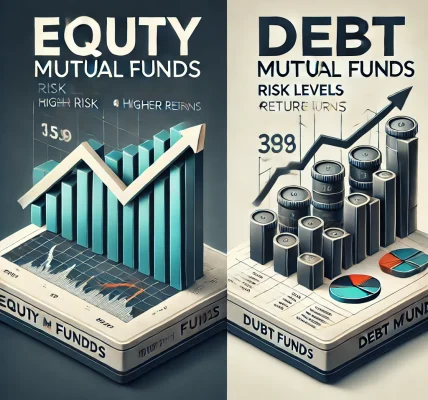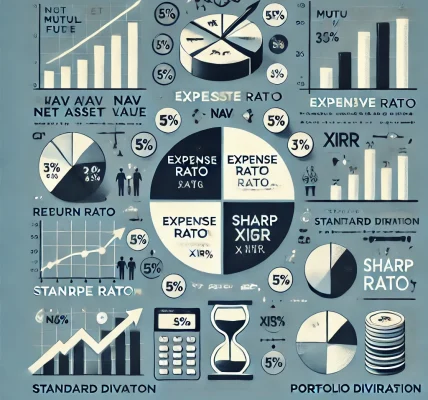Introduction
Investing in mutual funds is one of the most effective ways to grow wealth, but choosing the right type of mutual fund can be a challenge. Among the various options, equity mutual funds and debt mutual funds are two primary categories that cater to different investor needs. Understanding their differences, risk levels, and suitability is crucial for making informed investment decisions. In this blog, we will compare equity and debt mutual funds, analyze their benefits and risks, and help you determine which one aligns with your financial goals.
What Are Equity and Debt Mutual Funds?
Equity Mutual Funds
Equity mutual funds invest primarily in stocks or shares of companies. These funds aim to generate long-term capital appreciation and are best suited for investors who can tolerate higher risk for potentially higher returns.
- Types of Equity Mutual Funds:
- Large-Cap Funds: Invest in well-established companies with stable returns.
- Mid-Cap Funds: Invest in mid-sized companies with moderate risk and growth potential.
- Small-Cap Funds: Focus on small companies with high growth potential but higher risk.
- Sectoral/Thematic Funds: Target specific industries like technology, healthcare, or finance.
- Multi-Cap Funds: Diversified across companies of different market capitalizations.
Debt Mutual Funds
Debt mutual funds invest in fixed-income instruments like government bonds, corporate bonds, treasury bills, and other debt securities. These funds aim to provide stable and predictable returns with lower risk compared to equity funds.
- Types of Debt Mutual Funds:
- Liquid Funds: Short-term funds with minimal risk, ideal for emergency funds.
- Corporate Bond Funds: Invest in high-rated corporate debt for moderate returns.
- Government Securities Funds (Gilt Funds): Invest in government bonds with no default risk.
- Short-Term & Long-Term Debt Funds: Suited for different investment horizons.
- Dynamic Bond Funds: Adaptable to interest rate changes, balancing risk and return.
Key Differences Between Equity and Debt Mutual Funds
| Feature | Equity Mutual Funds | Debt Mutual Funds |
|---|---|---|
| Risk Level | High | Low to Moderate |
| Returns | High, market-dependent | Moderate, predictable |
| Investment Horizon | Long-term (5+ years) | Short to medium-term (1-5 years) |
| Volatility | High | Low |
| Taxation | Taxed as per long-term and short-term capital gains | Taxed based on holding period and indexation benefits |
| Liquidity | High but subject to market fluctuations | High, depending on the type of debt fund |
Factors to Consider When Choosing Between Equity and Debt Funds
1. Investment Goals
- If your goal is long-term wealth creation, equity mutual funds are ideal.
- If your goal is capital preservation with stable returns, debt mutual funds are better.
2. Risk Tolerance
- Equity funds are suitable for risk-taking investors who can withstand market fluctuations.
- Debt funds are ideal for conservative investors seeking lower risk.
3. Time Horizon
- A longer investment horizon (5+ years) favors equity funds.
- A short to medium-term horizon (1-5 years) is better for debt funds.
4. Market Conditions
- During economic growth, equity funds offer better returns.
- In uncertain or recessionary conditions, debt funds provide stability.
5. Tax Efficiency
- Equity funds attract Short-Term Capital Gains Tax (STCG) at 15% if held for less than a year and Long-Term Capital Gains Tax (LTCG) at 10% beyond ₹1 lakh.
- Debt funds are taxed based on holding period:
- Short-term (less than 3 years) – taxed as per income slab.
- Long-term (3+ years) – 20% with indexation benefits.
Who Should Invest in Equity Mutual Funds?
- Young investors with a long-term investment horizon.
- Individuals seeking high returns and willing to take risks.
- Investors with a diversified portfolio, including safer assets.
Who Should Invest in Debt Mutual Funds?
- Conservative investors who prefer stability over high returns.
- Retirees or individuals with short-term financial goals.
- Investors looking for low-risk, predictable income.
Can You Invest in Both Equity and Debt Mutual Funds?
Yes! Many investors prefer a balanced portfolio with a mix of equity and debt mutual funds to optimize risk and returns. This is known as asset allocation.
- Aggressive Investors: 70% equity, 30% debt.
- Moderate Investors: 50% equity, 50% debt.
- Conservative Investors: 30% equity, 70% debt.
Alternatively, investors can choose hybrid or balanced funds, which automatically adjust the proportion of equity and debt investments.
Common Mistakes to Avoid
- Investing Without a Clear Goal – Choose funds based on your financial objectives.
- Ignoring Risk Appetite – High returns come with high risk.
- Chasing Past Performance – Past performance does not guarantee future returns.
- Not Diversifying Properly – Relying too much on either equity or debt may be risky.
- Ignoring Tax Implications – Understand taxation before investing.
Conclusion
Choosing between equity and debt mutual funds depends on your risk appetite, investment goals, and time horizon. Equity funds are ideal for long-term wealth creation, while debt funds offer stability and lower risk. A balanced approach with a mix of both can provide the best of both worlds. Always conduct thorough research or consult a financial advisor before investing.
By making an informed decision, you can maximize returns while ensuring financial security. Happy investing!




